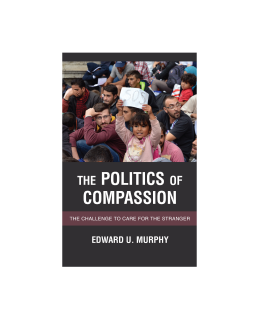
Additional Information
Book Details
Abstract
The Politics of Compassion explores the manifold obstacles that hinder our individual and collective capacity to care for the vulnerable, offering insights from history, religion, ethics, cognitive and social sciences, international relations, public policy, and contemporary politics. It examines both how far we’ve come in addressing poverty and social injustice and how far we still have to go. It concludes by discussing strategies to help us achieve a more consistent practice of compassion in public life.
This timely volume about compassion in politics is informed by a wide range of disciplines and perspectives. Students seeking to understand the history and development of policies for the economically disadvantaged and the stranger in our midst will find Edward Murphy's well-documented analysis relevant and compelling.
Constance Willard Williams, Associate Professor Emerita, Brandeis University
The Politics of Compassion provides a timely and compelling discussion of the ways in which emotions of empathy and compassion can and should play a role in our societies’ treatment of marginalized and disadvantaged populations. A comprehensive and well-written account which brings a new contribution to current debates.
Jane Freedman, Professor, Université Paris 8
Edward U. Murphy is a Lecturer in the Department of Global Studies and International Affairs, College of Professional Studies, Northeastern University, Boston. His teaching, research, and writing focus on issues of poverty, social justice, global development, public policy, and international relations. He has also conducted program evaluations and policy analysis for several community-based organizations. Early in his career, he worked in southern Africa for UNICEF. He received a doctorate in Social Policy from the Heller School at Brandeis University. His broad-ranging academic background and diverse intellectual interests give him a decidedly global, interdisciplinary perspective on social justice, public policy, and politics.
Why do good people turn a blind eye to the suffering of strangers? In this comprehensive and engaging book, Edward U. Murphy answers this question by examining ethical, historical, religious and psychological perspectives on compassion. Most importantly, he shows how to combine these perspectives with savvy political advocacy in order to motivate effective actions to reduce suffering, injustice, and poverty.
Paul Slovic, Professor of Psychology, University of Oregon
Table of Contents
| Section Title | Page | Action | Price |
|---|---|---|---|
| Contents | 7 | ||
| Preface | 9 | ||
| 1 Why Compassion in Politics? | 15 | ||
| 2 Historical Perspectives on Social Welfare and International Development | 31 | ||
| 3 Historical Perspectives on Human Rights | 51 | ||
| 4 Compassion in Religious and Secular Thought | 67 | ||
| 5 Justice and Moral Responsibility | 87 | ||
| 6 Altruism, the Limits of Empathy, and the Making of “Us” and “Them” | 109 | ||
| 7 The Moral Politics of Liberals and Conservatives | 135 | ||
| 8 Politics against Compassion in the United States | 153 | ||
| 9 Compassion in Public Policy and Law | 167 | ||
| 10 Creating a More Compassionate and Just Society | 195 | ||
| Index | 227 | ||
| About the Author | 239 |
